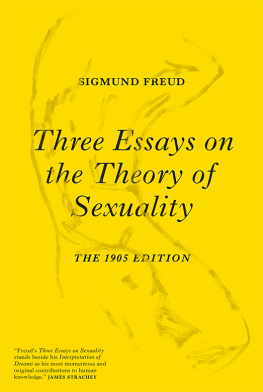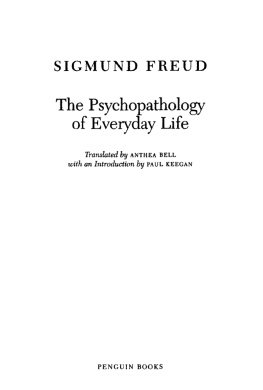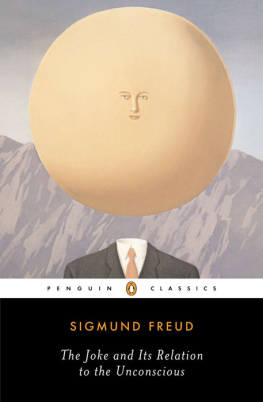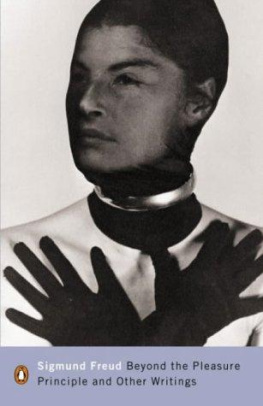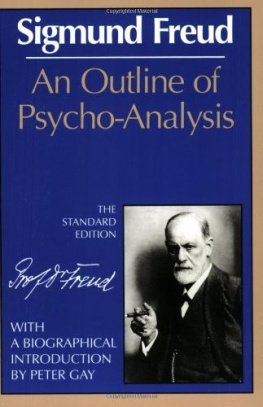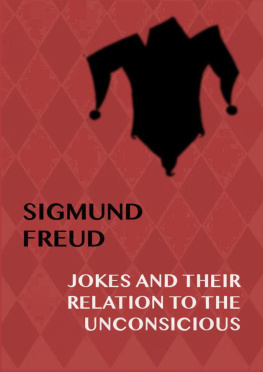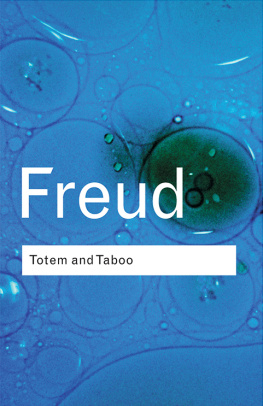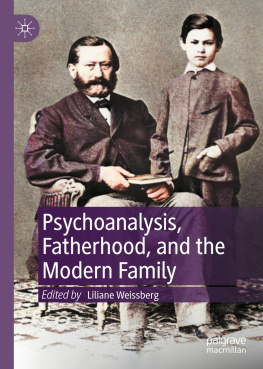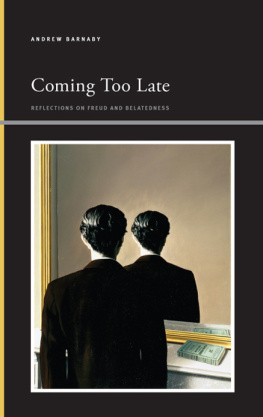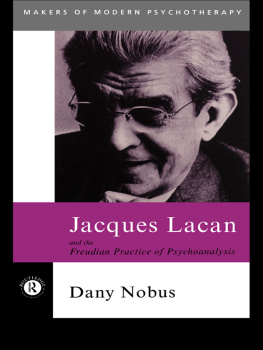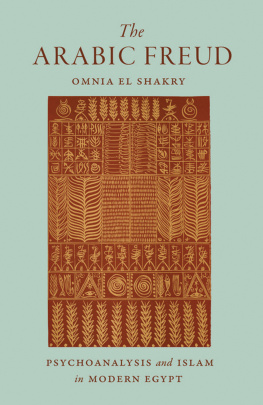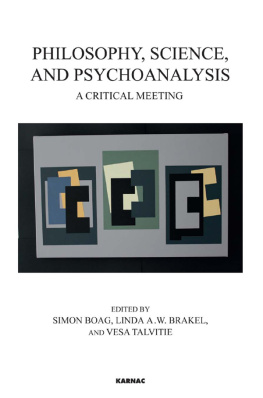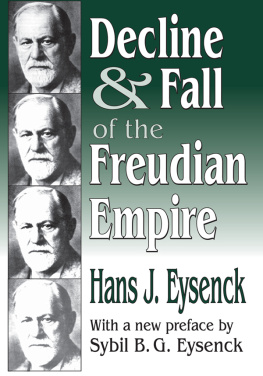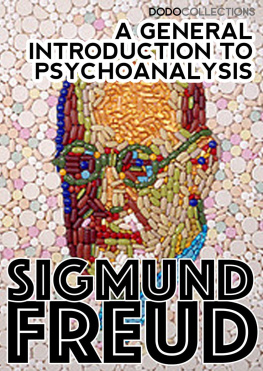
Three Essays on the Theory of Sexuality
Philippe Van Haute is professor at the Center for Contemporary European Philosophy, Radboud University Nijmegen, the Netherlands, and extraordinary professor of philosophy at the University of Pretoria, South Africa. He is a psychoanalyst of the Belgian School for Psychoanalysis and a founding member of the International Society for Psychoanalysis and Philosophy. He has published numerous books, among them Against Adaptation (2001), Confusion of Tongues (with Tomas Geyskens, 2004), From Death Instinct to Attachment Theory (with Tomas Geyskens, 2007), and A Non-Oedipal Psychoanalysis? (with Tomas Geyskens, 2012). He is the coeditor of the book series Figures of the Unconscious (Louvain University Press).
Herman Westerink is associate professor at the Center for Contemporary European Philosophy, Radboud University Nijmegen, the Netherlands, and extraordinary professor at the University of Leuven, Belgium. He is a member of the International Society for Psychoanalysis and Philosophy. He has published numerous books and articles on psychoanalysis, including A Dark Trace (2009) and The Heart of Mans Destiny (2012). He is editor of the book series Sigmund Freuds Werke: Wiener Interdisziplinre Kommentare (Vienna University Press).
Ulrike Kistner is professor at the Department of Philosophy at the University of Pretoria, South Africa. She has published Commissioning and Contesting Post-Apartheids Human Rights (2003) and numerous articles on political, aesthetic, and psychoanalytic theory.
Three Essays on the
Theory of Sexuality
The 1905 Edition
BY
SIGMUND FREUD
Translated by Ulrike Kistner
Edited and Introduced by
Philippe Van Haute and Herman Westerink

First published in English by Verso 2016
First published as Drei Abhandlungen zur Sexualtheorie
Franz Deuticke 1905
Translation Ulrike Kistner 2016
Introduction Philippe van Haute, Herman Westerink 2016
All rights reserved
The moral rights of the authors have been asserted
1 3 5 7 9 10 8 6 4 2
Verso
UK: 6 Meard Street, London W1F 0EG
US: 20 Jay Street, Suite 1010, Brooklyn, NY 11201
versobooks.com
Verso is the imprint of New Left Books
ISBN-13: 978-1-78478-358-7 (PB)
ISBN-13: 978-1-78478-360-0 (HB)
ISBN-13: 978-1-78478-359-4 (US EBK)
ISBN-13: 978-1-78478-357-0 (UK EBK)
British Library Cataloguing in Publication Data
A catalogue record for this book is available from the British Library
Library of Congress Cataloging-in-Publication Data
A catalog record for this book is available from the Library of Congress
Typeset in Sabon MT by Hewer Text UK Ltd, Edinburgh
Printed in the US by Maple Press
Content
Foreword: The Missing Object
by Philippe Van Haute, Herman Westerink, and Ulrike Kistner
Introduction: Hysteria, Sexuality, and the Deconstruction of NormativityRereading Freuds 1905 edition of Three Essays on the Theory of Sexuality
by Philippe Van Haute and Herman Westerink
Translating the First Edition of Freuds Drei Abhandlungen zur Sexualtheorie
Ulrike Kistner
by Philippe Van Haute, Herman
Westerink, and Ulrike Kistner
Sigmund Freud published the first version of Three Essays on the Theory of Sexuality in 1905, the same year in which he published Fragment of an Analysis of Hysteria (Dora) and Jokes and Their Relation to the Unconscious. These three books, together with others written in that period, can only be properly understood through the intrinsic reference that binds them to one another. These three books illuminate each other and Freuds thinking in that period.
But something strange happened in the subsequent editions of Three Essays and their reception. Freud kept rewriting his Three Essays over the years. He republished them four times between 1905 and 1924, and each time he added large paragraphs in which he explained the theoretical insights that he had developed in the meantime. As a result, the 1924 edition of the text is twice as long as the original one, and it contains theoretical insights that bluntly contradict Freuds original positions of 1905. It is this 1924 edition that was published in the final officially approved collection of Freuds works. This at least partly explains why the first edition of Three Essays was never published in any language other than German. In this way, the first edition became like a missing object that every Freud scholar referred to as 1905d, but that in fact was absent and unknown. At the same time, the officially approved version of 1924 was a decontextualized version no longer bound to Freuds 1905 projects and thoughts.
This situation has undoubtedly had dramatic effects. Of course, it is well known that the text of Three Essays that we find in Gesammelte Werke and the Standard Edition is not the original version of 1905. James Strachey did a very good job in indicatingthough with some omissions in the 1905 edition. Quite the contrary, according to this edition, the crucial problematic that lies at the basis of hysteria is not this famous complex, but bisexuality. Reading Dora against the background of the 1905 edition reveals a picture different from the one that emerged when the case history is read against the background of the 1924 edition.
But this is not all. The very idea of an Oedipus complex would have been a theoretical impossibility in 1905. Indeed, the complex implies that infantile sexuality is object-related. But in 1905, Freud consistently thematizes infantile sexuality as essentially autoerotic. Infantile sexuality is without an object. This also explains why Freud links oedipal themes in the first edition to (object-related) pubertal sexuality. This view is in direct contradiction with the historiographic tradition that until today claims that psychoanalysis starts at the very moment when Freud gave up the theory of seduction (his neurotica) in 1897, and reinterpreted the stories of his patients as the disguised expressions of oedipal fantasies. The history of Freudian thinking is in fact far more complicated than many would think, and the first edition of Three Essays is a crucial element in this history. Hence the importance of its translation.
The first edition of Three Essays is not only important for historical reasons. Psychoanalysis has been severely criticized in the pastand with good reasonfor its heteronormative approach to sexuality. This approach can take many forms, but it is almost always linked to one of the many versions of the Oedipus complex. A critique of psychoanalytic heteronormativity, therefore, would have to entail a critique of the role accorded to the Oedipus complex. The first edition of Three Essays contains a theory of sexuality that in no way anticipates the later oedipal theories. Quite the contrary, the 1905 edition identifies infantile sexuality with nonfunctional pleasure, and discusses this relation without any reference to an object or to sexual difference. This approach allows for a critique of a binary conception of sexuality and, more generally, of sexual identity politics characterizing not only conservative theories, but also many feminist theories of sexuality.
In this first edition, Freud further conceptualizes a pathoanalysis of (sexual) existence. In order to understand the (sexual) existence of the human being, one has to start from psychopathology. Psychopathology shows us in a magnified way the tendencies and problematics that we all have to deal with. In this way, psychiatry and psychopathology attain an anthropological significance. They inform us less about diseases or disorders than about the human being as such. This idea undermines the distinctions between normal, abnormal, and pathological.

